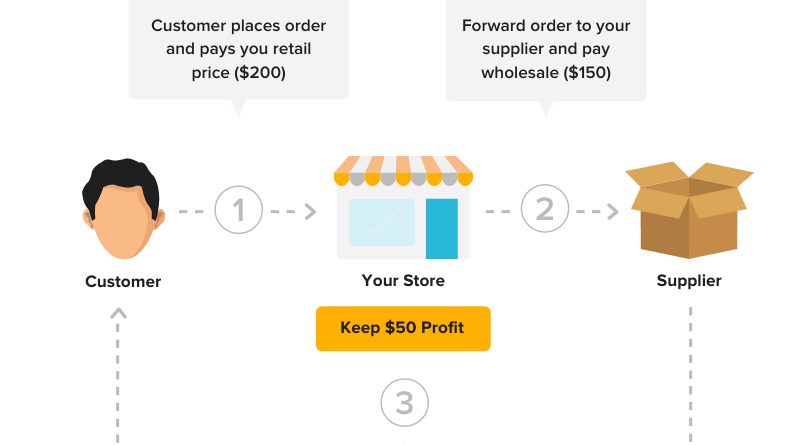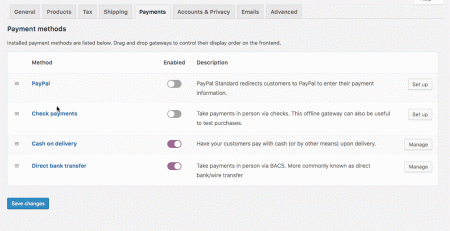AMAZON DROPSHIPPING GUIDE
What is Dropshipping?
Dropshipping is the process of selling a product without the responsibility of carrying inventory or shipping the goods.
The product manufacturer is responsible for manufacturing the product, maintaining inventory and shipping the goods to the customer.
Your job as a dropshipper is to maintain an online store where you handle everything customer-related, from taking their orders, placing those orders with your supplier, and managing customer service.
Benefits of Dropshipping
To help you better understand why and how to dropship on Amazon, let’s look at a few of the benefits of dropshipping.
Hold no inventory
One of the biggest benefits of dropshipping is that the dropshipper doesn’t need to carry any inventory. This is great because it makes the business model less risky for the dropshipper.
As there’s no inventory to carry, there’s less work involved in the business. There are also fewer overhead costs, as you don’t need to pay for a warehouse to hold the inventory.
Test products easily
Another great benefit of dropshipping is that you can test products easily. Since you don’t carry inventory, you can run ads on products to see which products convert best.
If certain items aren’t high performers, you can remove them from your store. Since you didn’t purchase inventory, there’s no cost, aside from advertising, for a low-performing product.
In the event that you want to eventually purchase inventory, you’ll also know which products sell well and how many of them you can sell easily.
Low start-up cost
Here are a few examples to illustrate the low-cost business model of dropshipping:
- You only purchase products when a customer places an order.
- There’s no warehouse needed for inventory.
- You don’t need to hire extra employees to manage the shipping of products.
- Your main expenses include the cost of goods, advertising, and website.
Amazon Dropshipping Q&A
Here are some of the most commonly asked questions about dropshipping on Amazon.
How Does Amazon Work?
Amazon is one of the biggest ecommerce websites in the world. It grew in popularity because it allows retailers to sell their products on their platform.
Manufacturers and brands are able to sell on Amazon as an additional sales channel for their stores.
You’ll be able to start selling on Amazon right after you’re approved for an Amazon seller account, you’ll be able to start selling on Amazon. Just keep in mind that not all brands and products get approved.
How Does Amazon Dropshipping Work?
So, how exactly do you start dropshipping on Amazon? You can dropship on Amazon through their Fulfilled by Amazon program.
In this program, you ship your products to Amazon where they carry the inventory and ship directly to your customers.
The benefit of this program is that Amazon has some of the fastest shipping times on the market, so your customers get their products even sooner. If there’s one thing we’ve learned from the 21st century, it’s that customers love fast delivery times.
Is Amazon Dropshipping Legal?
Yes, Amazon allows their merchants to dropship on their platform as long as you play by a few key rules.
You must always:
- Be the seller on record of your products.
- Identify yourself as the seller of your products on all packing slips and other information included or provided in connection with them.
- Be responsible for accepting and processing customer returns of your products.
- Comply with all other terms of your seller agreement and applicable Amazon policies.
Examples of dropshipping that are not permitted:
- Purchasing products from another online retailer and having that retailer ship directly to customers.
- Shipping orders with packing slips, invoices, or other information indicating a seller name or contact information other than your own.
You can read more about how to dropship with Amazon on their website here.
Benefits of Amazon Dropshipping
In this part of our Amazon dropshipping guide, you’ll learn some of the benefits of Amazon dropshipping.
No warehouse cost
One of the benefits of Amazon dropshipping is that you don’t need to pay for the cost of a warehouse. Some Amazon sellers choose to make their products FBA (Fulfilled by Amazon). With FBA, sellers ship their products to Amazon and Amazon sends the products out for them.
Amazon Suppliers
Amazon buys products in bulk from many European suppliers. Amazon then holds this supply in their warehouses, ready to ship to customers. The company also handles returns and customer service in many different languages for all Amazon suppliers.
With Amazon, suppliers (even small businesses) can grow quickly and operate globally. Plus, Amazon suppliers receive help from account managers to strategically guide their business to increase profits long-term.
Large audience to sell to
Amazon has 300 million active users. This means using Amazon as a sales channel for your business can mean huge returns. Sell the right product at the right price and you can lure in new customers.
Another benefit is the ability to easily reach new customers your store wouldn’t have reached on its own. This will help you to expand your target audience. Who knows, you might even discover a whole new audience you never even knew was interested!
Multiple categories to target
Amazon has over 30 categories that you can target.
So you may decide to sell in two, three, five, or as many niches as you desire.
With the right products and trustworthy suppliers, there’s no limit to how many categories and niches you can cater to.
For instance, you can sell in the Electronics and Tools & Home Improvement categories simultaneously, as there’s nothing to prevent you from serving multiple audiences.
How to Sell on Amazon in 8 Steps
1. Choose an ecommerce platform
As Shopify recently partnered with Amazon, using their ecommerce platform would be ideal. Shopify allows users to add Amazon as a sales channel to simplify managing orders on both platforms.
2. Sell the right products
There are several requirements and restrictions for store owners who want to sell their product on Amazon.
According to Amazon’s list of eligible stores, you can open up an Amazon store without approval if you’re in a niche like books, computer and video games, electronics, office products and the like
Take a peek at Amazon’s list of restricted products to make sure you’re not in any of these categories. These items include things like hoverboards and dangerous goods.
3. Create an Amazon seller account
If you plan on selling a high volume of products, it’s best to have a professional account. In the individual selling plan, you’re charged 0.99 cents per item sold, which can eat away at your margins.
Keep in mind that you’ll also need to offer competitive pricing and the occasional discount, while still ensuring you make a large enough profit to reinvest in the business. So watch your margins. With a professional seller account, you pay a subscription each month, as well as a few additional fees.
You’ll want to register with your email on Amazon Seller Central. Then, you’ll need to fill out your name, email, and password. You’ll then need to provide more details about your business, such as address and tax information.
4. Get approved in your product category
As I mentioned earlier, certain niches and product types require Amazon approval. Fashion, beauty, and jewelry are some of the popular niches that require approval before starting up your Amazon store. You can view the specific approval requirements for each category.
5. Set up your Amazon account on Shopify
Once you’ve been approved and your account is created, connect your Amazon account to your Shopify store. On the left panel in your Shopify account, scroll down to ‘Sales Channels’ and click the + button beside it.
You’ll have a pop-up come up. Amazon should be the first item on the list. Click ‘Add Channel.’
Then, continue with ‘Connect to Amazon.’
6. Create Amazon product listings with ease
Click on the Amazon sales channel link, see Shopify’s left panel. Click ‘Create Listing.’
Next, click ‘Select Product.’ You’ll see two options. If your brand makes the product, you’ll need to make sure you purchase UPC codes. But as a dropshipper, you’ll click on the second option: ‘This product is made by another brand.’
Next, you’ll be able to search for the product to become a seller for that SKU. Once you’ve found the product, click ‘Select.’ Lastly, you’ll need to click ‘Publish’ to finish the process.
7. Have Shopify track inventory
Make sure that Shopify tracks inventory levels. This ensures that when a customer orders on Amazon, the product is still in stock.
Make sure you don’t allow customers to order products that are out of stock – this can lead to negative reviews and some extra customer service time you didn’t plan on spending.
8. Start promoting your Amazon store
You won’t get any sales if nobody knows about your store, right? The next step is to send traffic to it.
Be sure to promote your store on any social channels you have. You can also create Amazon ads to help bring in some new eyeballs and boost sales.
Bonus Strategies for Succeeding on Amazon
In this part of the Amazon dropshipping guide, you’ll learn a few strategies for succeeding on Amazon.
Win the Buy Box
Most of Amazon’s sales come from the Buy Box. This means your goal as a dropshipper is to win the Buy Box so you can maximize your sales like the pros.
First, you’ll need to have a high seller rating. Many have found having a rating above 95% has worked well for them.
Second, you need to ship products quickly, ideally within 14 days.
Third, your cost (shipping and product cost total) should be lower than most of the other offers being presented. Having a low refund rate, fast customer response time, and high feedback score also help you win the Buy Box.
Don’t rely on Amazon
Don’t be dependent on sales from Amazon alone. Explore other platforms too. By having Amazon as one of many sales channels, you improve your odds for sales while minimizing risk.
With Shopify, you can add other sales channels such as Instagram, Facebook Messenger, and Facebook Shops to grow your brand’s audience.
It’s also worth noting that if a customer recognizes your brand, they’ll be more likely to buy from you on Amazon. Be where your customers are.
Aim for a 95% seller rating
Having a 95% or higher seller rating has improved the likelihood that you’ll win the Buy Box. It’s also great because it makes you more likely to appear in organic searches.
It’s important to have a high seller rating, as this gives a major boost to earning a potential customer’s trust. It gives your Amazon store a competitive advantage over those with lower ratings.
Do keyword research
Just as you’d optimize your store’s product pages for search engines, when you’re learning how to dropship on Amazon, you should optimize your Amazon product pages as well.
You can use tools like Merchant Words to find popular keywords. If you run Amazon ads, you’ll also have access to a supply of keywords you can use to optimize your product pages.
Doing this well will help you rank high organically. If you’re running ads, it’ll help you target customers better.
Make sure you price your products accordingly
When pricing products for Amazon, there are a few factors to consider. First is the cost of Amazon fees. You want to make sure your margins are high enough that you can afford to pay Amazon’s monthly and other associated fees.
You also want to make sure your margins are high enough to make a profit. When you dropship with Ez Solutions, you can often offer free or cheap shipping, which is another way to help stay competitive.
Offer a better coupon discount than competitors
By creating an Amazon coupon, you can help encourage customers to buy from you. If you promote the coupon to coupon sites, you can help drive more traffic from those looking to score sweet deals.
Just remember that you need to price the coupon in a way that allows you to pay your expenses and remain profitable.
Optimize your product titles for user intent
Amazon favors listings whose titles are relevant to buyer’s search terms, rather than being stuffed with keywords.
Put simply, titles that focus on user intent get the attention of people. As such, it’s worth spending some time thinking about what buyers hope to find when conducting searches related to your products.
Information that matters to buyers includes product attributes such as model, size, color, quantity, etc.
Pro tip: Use the brand name as the first word in the title. Blueboard found that 93% of best-selling Amazon products started with the name of the brand. Even if you’re considering dropshipping items from China, don’t neglect using the local brand name in your titles.
Amazon Dropshipping Tools
Here’s a list of tools that will come in handy when you’re learning how to start dropshipping on Amazon.
Merchant Words – You can use Merchant Words to view the search volume and data of keywords. The pro plan costs $30/month.
FeedCheck – FeedCheck allows you to view all your product reviews in one place. It’s a great tool if you have a large selection of Amazon products in your store. By having easy access to reviews, you can work on improving your reviews while providing better customer service. It also allows you to monitor competitor’s products. Their pricing starts at $19/month.
Shopify – You can use Shopify to add Amazon as a sales channel to your store. Shopify can also be used to track your inventory and alert you if you have Amazon sales you need to fulfill. To take advantage of Shopify, make sure that you have not selected FBA for shipping your products.
Sellery – This tool has repricing strategies to help you win the Amazon Buy Box. It allows you to run pricing experiments to stay competitive while maximizing profits. You can try this one for free.
Feedback Express – Feedback Express helps you get more reviews on your Amazon store. It also helps remove negative reviews so you can keep a high rating on your products and store. You can even blacklist customers who are notorious for leaving negative reviews. Pricing starts at $20/month.
Amazon Volume Listing Tools – Amazon offers various tools to simplify your seller experience. You can easily download spreadsheets for order and inventory information. You can also modify pricing and product quantity with ease.
Dropshipping From Amazon to Ebay
Dropshipping from Amazon to eBay is a dropshipping model that has been used for many years. This model sees sellers buying underpriced items on Amazon and selling them for a higher price on eBay.
This normally means that the end user, who bought the product from eBay, will receive the product in Amazon packaging – which is not a great user experience for them.
Although it’s not illegal to partake in this dropshipping from Amazon to Ebay, it’s frowned upon by manufacturers. That’s because this model increases profits for the dropshipping without the manufacturer knowing about the activity.
Plus, eBay doesn’t really like the idea of dropshipping from Amazon to eBay, which is perhaps why the company banned hundreds of Israeli merchants using this model back in 2017.
So if you’re aiming to build a reputable dropshipping business, it’s best to stay away from this model.
Want to Dropship for Your Own Brand Instead?
Don’t want to sell on Amazon? Those who want to dropship their own products can use Ez Solutions to dropship from a massive selection of millions of products.
You’ll find products in women’s and men’s fashion, beauty, watches, jewelry, home improvement and decor, and much more.
And with a click of a button, you’ll be able to add your product to your website so you can start selling today. Learn about the advantages of dropshipping vs Amazon to get started.






Leave a Reply
You must be logged in to post a comment.